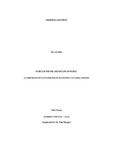JavaScript is disabled for your browser. Some features of this site may not work without it.
| dc.contributor.advisor | Burgess, Paul J. | |
| dc.contributor.author | King, Helen | |
| dc.date.accessioned | 2012-10-24T08:32:05Z | |
| dc.date.available | 2012-10-24T08:32:05Z | |
| dc.date.issued | 2012 | |
| dc.identifier.uri | http://dspace.lib.cranfield.ac.uk/handle/1826/7627 | |
| dc.description.abstract | The ecosystem services approach is a set of institutional practices which aim to improve natural resource management and policy making, by highlighting the relationship between well-functioning ecosystems and human wellbeing. Within the approach, cultural services (CS) signify the psycho-social aspects of people-nature interrelations. This concept is an understudied area, and is recognised to exhibit high levels of complexity which make it difficult to evaluate. This thesis deconstructs, explores, clarifies and enhances the CS concept. A flexible, phased research design explores cultural services in relation to a specific case-study site, 'Aspley Woods and Heaths' (England). Cultural services are examined through a series of lenses: as an interdisciplinary construct, as an experience of place, as context, as a resource regime, as a discursive resource and as a personal discourse. Mixed qualitative methods identify how CS is constructed through action, speech and text; via an in depth analysis of primary data from semi-structured visitor and expert interviews, unstructured key informant interviews, and marginal participant observation. Additional data informs the enquiry, from a discourse analysis of key study site documents, and a review of site-related historic, ecological, land management, and policy documents. Results from this thesis subsequently challenge the current published definition and subcategorisation of cultural services. The notion that cultural services are nonmaterial is disputed due to the centrality of physical activities, physical sensations, and access management regimes which require material inputs. The benefits premise is challenged since CS experiences included references to anxiety, injury and conflict. The notion that CS are obtained is disputed due to the reciprocal nature of information exchange between people and features of the environment. The idea that CS are solely from ecosystems is challenged due to the part played by interpretative socio-cultural contexts, and natural and social processes which occur outside site boundaries and specified time frames. Instead, this thesis recommends that cultural services be redefined as the ways that humans use discourse to construct and communicate perceptions of nature. CS arise from processes of interaction (activities) and reciprocal information exchange (information functions) with ecosystems. CS subcategories are hence a series of cognitive, retrospective, intuitive, creative, communicative and regenerative interpretative repertoires, which form the basis of social practices such as designation, restoration and policy. The propensity of environments to embody discourse is concluded to be crucial in defining what is valuable about natural ecosystems, and how these contribute to wellbeing. | en_UK |
| dc.language.iso | en | en_UK |
| dc.publisher | Cranfield University | en_UK |
| dc.rights | © Cranfield University 2012. All rights reserved. No part of this publication may be reproduced without the written permission of the copyright owner. | en_UK |
| dc.subject | social | en_UK |
| dc.subject | psychological | en_UK |
| dc.subject | qualitative | en_UK |
| dc.subject | discourse | en_UK |
| dc.subject | environment | en_UK |
| dc.subject | wellbeing | en_UK |
| dc.title | People in nature and nature in people: a constructivist exploration of ecosystem cultural services | en_UK |
| dc.type | Thesis or dissertation | en_UK |
| dc.type.qualificationlevel | Doctoral | en_UK |
| dc.type.qualificationname | PhD | en_UK |
